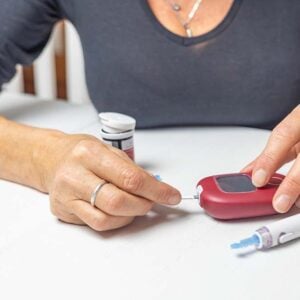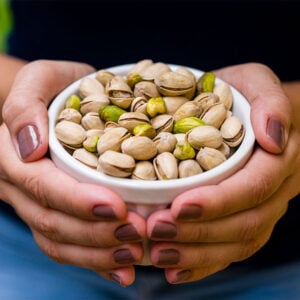
Food Trick RESETS Your Body Clock
If you didn’t know already, your body runs on an invisible “24-hour clock” that follows the rhythm of the sun.
It’s called your circadian rhythm.
This biological clock affects the production and release of hormones, insulin regulation, sleep, and much more.
But all kinds of things can knock the clock off balance. Some examples include stress, exposure to artificial light, poor sleep, pain, and illness.
One of the BEST ways to regulate your circadian rhythm is to get appropriate sun exposure during the day and limit your blue light exposure at night.
But there’s another weird way to reset this clock that has nothing to do with light. Instead, it’s linked to FOOD.
Believe it or not, your diet impacts your circadian rhythm. But it’s not about WHAT you’re eating… but WHEN.
In a new study, two groups of mice were fed a high-calorie diet. One group had unlimited access to the food while the other was given a 9-hour eating window (they fasted for the other 15).
This mimicked something called intermittent fasting. It’s a diet method that limits your eating window to a short period, like 6, 8, or 10 hours.
Intermittent fasting is a great way to lose weight and boost your overall health. It’s also excellent at balancing blood sugar and reducing inflammation.
In fact, it’s something I like to routinely incorporate into my OWN lifestyle.
But the new mouse study revealed something remarkable. It showed that in the time-restricted eating group, 70 percent of their genes responded in more than 22 regions of the body.
These included the liver, stomach, brain, heart, lungs, and more.
Plus, areas of the body that regulate hormones and circadian rhythm were also impacted. Specifically, 40 percent of genes in the adrenal gland, hypothalamus, and pancreas were affected by intermittent fasting.
The researchers explained, “We found that time-restricted eating synchronized the circadian rhythms to have two major waves: one during fasting and another just after eating. We suspect this allows the body to coordinate different processes.”
This study gives us further insight into ways to support our circadian rhythm.
In addition to practicing intermittent fasting, you can keep your body’s biological clock running smoothly by getting sunlight first thing in the morning, avoiding blue light at night, sticking to a consistent bedtime, and not eating after dinner.
P.S. Staying up past dark—and exposure to artificial light at night—doesn’t JUST set you up for sleep and hormone problems. It’s a significant factor in the recent type 2 diabetes surge. I’ve got the scoop RIGHT HERE.
SOURCE:
“Diurnal transcriptome landscape of a multi-tissue response to time-restricted feeding in mammals,” Cell Metabolism, Volume 35, Issue 1, 2023, Pages 150-165.e4, ISSN 1550-4131, doi.org/10.1016/j.cmet.2022.12.006.
Written By Dr. Richard Gerhauser, M.D.
For years he’s been the trusted doctor for celebrities, world-class athletes, and countless seniors looking to reclaim their health.
And now…for the first time ever… he’s making his medical breakthroughs available to readers all across America.
Dr. Richard Gerhauser, M.D. is one of the most pioneering and innovative minds in medicine today – and he delivers cutting-edge cures each month through his Natural Health Response newsletter.
Natural Health Response readers get full access to Dr. Gerhauser’s protocols for chronic pain… heart disease… diabetes… Alzheimer’s… and even cancer. These are the very same treatments Dr. Gerhauser recommends to his own patients at his practice in Tucson, Arizona.
In addition to being a board-certified medical doctor, Dr. Gerhauser has earned two master’s degrees and has served as a clinical professor at the University of Arizona.
And as a physician at the world-famous Canyon Ranch, Dr. Gerhauser treated celebrities from around the world who paid dearly for the type of next-generation health information he provides Natural Health Response readers each month.
View More Free Articles
5 Ways to “Beat the Bloat” This Thanksgiving
As we prepare for Thanksgiving week, there’s a lot to look forward to and be thankful for. Family gatherings, football games, great food, and even better desserts top the list. Then there are all the leftovers. It’s not a holiday that’s known for moderation. But if you’re not careful, overdoing it on Thanksgiving could leave […]
Eat THIS to Reduce Your Risk of 14 Cancers
I’m a meat-and-potatoes guy. I’ll never turn down a big, juicy steak. But even more than that… I’m a fish guy. There’s not much I like more than a perfectly grilled salmon. I hope you do, too, because salmon contains two potent nutrients tied to a reduced risk of 14 types of cancer. Omega-3s are […]
The Bad Habit Robbing YEARS from Your Life
I often get eye-rolls when I stress just how essential lifestyle factors like light reducing pollution and grounding are good for health. But new research continually proves that I’ve been right all along. Today, a critical new study shows that something I’ve warned you about for YEARS is tied to a 34 percent increased risk […]
Reduce Colon Cancer Risk by 30%
More than 150,000 people are diagnosed with colorectal cancer yearly. Another 35,000 will get a liver cancer diagnosis. But if you have type 2 diabetes, your risk of developing one of these skyrockets—a 47 percent increased risk of colorectal cancer, and a two to three times higher risk of liver cancer. That’s why I’m excited […]
“Dinner Plate” Danger Raises Prostate Risk
Did you know that prostate cancer is FAR more prevalent in developed parts of the world than in less developed regions? Strange right? What is it about our modern, developed society that’s attacking our male population? There are MANY answers to this question. The primary one I will focus on today is a significant environmental […]
The 5-Minute Solution to Better Blood Pressure
Are you one of the millions who battle the so-called “silent killer” hypertension? And do you have five minutes to spare daily? If so, you could be well on your way to significantly healthier blood pressure. Sound too good to be true? A new study proves it. And the best part? It’s incredibly easy If […]
“Eye-Opening” Benefits of Pistachios
Imagine if there were a daily snack that could protect your vision. Well, a recent study brings good news for the 20 million U.S. adults already battling macular degeneration—the leading cause of vision loss for those over 60. Adding a handful of pistachios to your diet might help shield your eyesight. Let’s take a “look.” […]
Get Better Blood Sugar This Holiday Season
Let’s face it. The holidays are NOT good for your waistline… or your blood sugar levels. Potlucks, family dinners, cookie exchanges, Christmas parties… you know the drill. So, if you’re one of the 98 million people on the brink of type 2 diabetes, it’s VITAL to take steps to manage your blood sugar levels as […]
Common Vitamin Is a Hidden Colon Cancer Shield
With aggressive colon cancer on the rise in younger people, I’m always on the lookout for research showing how we can all lower our risks. Over the past few months, I’ve shared studies showing that stress, oral bacteria, obesity, and circadian disruption are all tied to colon cancer. And just last week I revealed how […]
Ditch Dieting for Better Blood Sugar Control
I’ll just say this right upfront… Type 2 diabetes is a lifestyle issue. And while diet is PART of the equation, it’s not the only thing to consider when managing your blood sugar. Over the past few months, I’ve highlighted research showing that factors like your bedtime and activity levels impact diabetes risk. Today, I […]










